Sue Abadie: A Tribute to Years of Devotion to Growing Youth Soccer
The youth soccer world has been built — to a large degree — on the backs of hardworking volunteers. Often, these devoted laborers to the beautiful game go unnoticed — but once in a while, we need to stop and recognize their significant contribution to the growth of youth soccer.
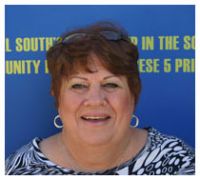 This article is a tribute to a woman who gave years of her life to helping the youth soccer game flourish — Sue Abadie. While she never kicked a soccer ball as a player, Abadie’s passion for the game is undeniable.
This article is a tribute to a woman who gave years of her life to helping the youth soccer game flourish — Sue Abadie. While she never kicked a soccer ball as a player, Abadie’s passion for the game is undeniable.
While volunteers can want to focus on the beautiful game and the soccer players who need their governance — regardless of good intentions, as in all walks of life, people can disagree. Abadie is a longtime advocate of keeping the focus on the game and avoiding the feudal-like fiefdoms which can stall progress.
Abadie stepped down from the Cal South board earlier this year in February — wanting to retire and sound a call for change — to always remember the goal is to help promote the game and the players.

Diane Scavuzzo: First of all, thank you for your years of volunteering — How long have you been involved in youth soccer?
Sue Abadie: Since 1968 when my daughter came home one day and said she wanted to sign up for AYSO. We had no idea what that was — and, we quickly became hooked.
My daughter and son both started playing soccer at AYSO in Fountain Valley, CA and when my son was about 9 years-old, he was asked to tryout for a competitive youth soccer club team. He played for South Coast SC, and NHB among other clubs.
Diane Scavuzzo: What ignited your passion for soccer?
Sue Abadie: Soccer allows diversity for all — with programs ranging from TOPSoccer to highly competitive youth soccer, this sport really unites people from all different backgrounds — and from around the world.
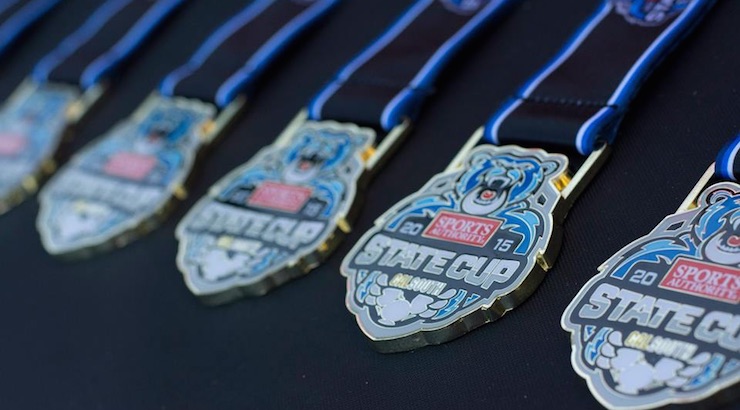
Diane Scavuzzo: Do you believe that youth soccer is only for the wealthy suburban white player?
Sue Abadie: No. If you travel around Southern California, you will see that the soccer fields are filled with the youth of all nationalities and abilities.
The best-kept secret is you don’t need a highly paid coach to teach the game.
Diane Scavuzzo: Does power — even in the volunteer youth soccer world — corrupt?
Sue Abadie: Yes. Obviously not on that level … but integrity and purpose should always be of the utmost importance.
Diane Scavuzzo: Why?
Sue Abadie: Because I think some people forget their roles are to help kids play soccer.
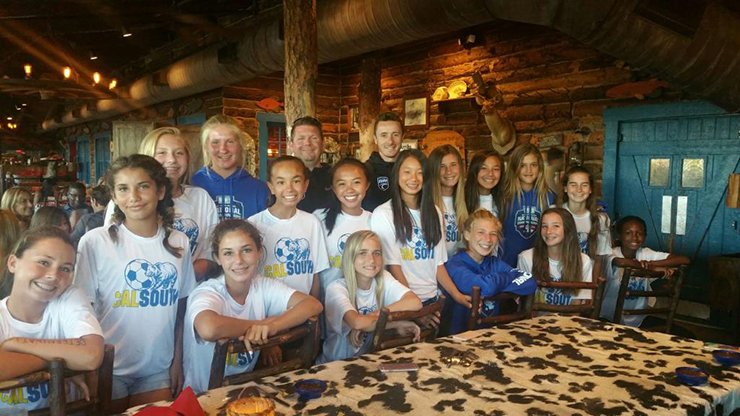
Diane Scavuzzo: Is youth soccer more of a business now than ever before?
Sue Abadie: Yes, very much so – but this is also a sign of its growth.
Diane Scavuzzo: Do you believe youth soccer has become too commercial?
Sue Abadie: Soccer provides an opportunity for kids to learn life skills. However, are today’s youth soccer coaches providing the right environment for the kids to grow or are some just there to make money? Sometimes I wonder.
Diane Scavuzzo: When did you join Cal South?
Sue Abadie: I joined Cal South in 2009 — my first position was District 3 Commissioner and I was a member of the Cal South Board for 8 years.
Diane Scavuzzo: What was Cal South like when you joined?
Sue Abadie: It was a great organization.
Everyone worked together for the kids and the good of the game.
Diane Scavuzzo: What is the accomplishment that you are most proud of?
Sue Abadie: I am most proud of my involvement in youth soccer — my decisions have always been based on what was best for the kids.
Diane Scavuzzo: You are over 65 years of age, right? What do you think is the most important life lesson that you’ve learned so far?
Sue Abadie: Truth, honesty, and integrity might not always be the popular choice, but it is always important to do the right thing.
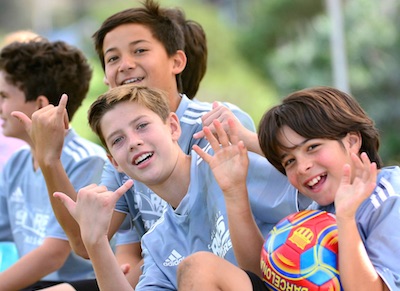
Diane Scavuzzo: As a state organization in US Youth Soccer, what do you believe is Cal South’s role in the world of soccer?
Sue Abadie: I believe Cal South’s role is to focus on coaching, refereeing, with an emphasis on education, and player growth.
Also, it is important that Cal South provides opportunities for players of all abilities to participate in the game.
Diane Scavuzzo: What more can Cal South do to help grow the sport of soccer?
Sue Abadie: Greater transparency is needed – And, of course, to remember that players and clubs come first. They are the only reason for Cal South’s existence.
Diane Scavuzzo: Teams from Cal South have historically won numerous Regional and National championships — What has helped make the Cal South youth soccer players consistently so successful?
Sue Abadie: We were successful in Regional and National championships for years and now the other states are catching up. This year we only won one National Championship.
In 2014, teams from Cal South won 6 National Championships. In 2015 teams from Cal South won 4 National Championships — and, last year, we also won 4.
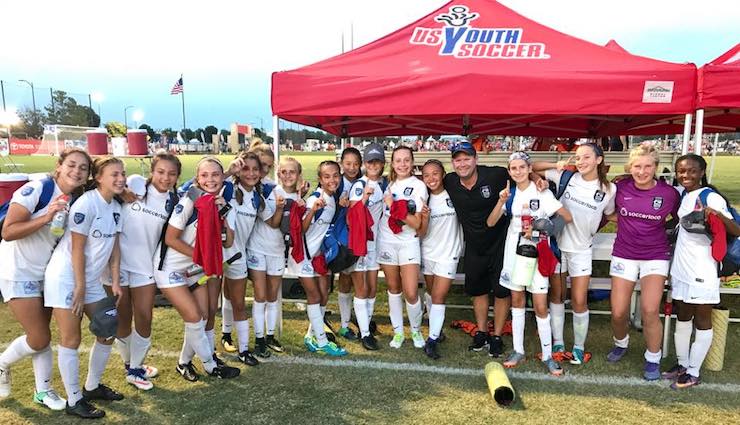
Diane Scavuzzo: Are we raising the bar on player development?
Sue Abadie: Based on my last answer — how effective are we at player development? I believe kids need smaller groups to apply the skills and techniques they learn.
Diane Scavuzzo: What can be done to encourage more youth soccer players to dream big — and to perhaps make a life in the soccer world?
Sue Abadie: Awareness – we need to effectively communicate and collaborate, and be better at marketing the opportunities which are available — perhaps harnessing stronger the power of social media.
Diane Scavuzzo: Why did you step down from the Cal South board recently?
Sue Abadie: I stepped down from the Cal South Board of Directors when many lost focus, many board members were having their own agendas and were not willing to have two-way conversations.
Everyone needs to work together to have the program work well.
Diane Scavuzzo: When a governing board becomes stale and deadlocked — what is the answer?
Sue Abadie: Is there a clear answer? When every agenda item is discussed at length and no decision can be reached, maybe it is time to get some new blood in the board room.
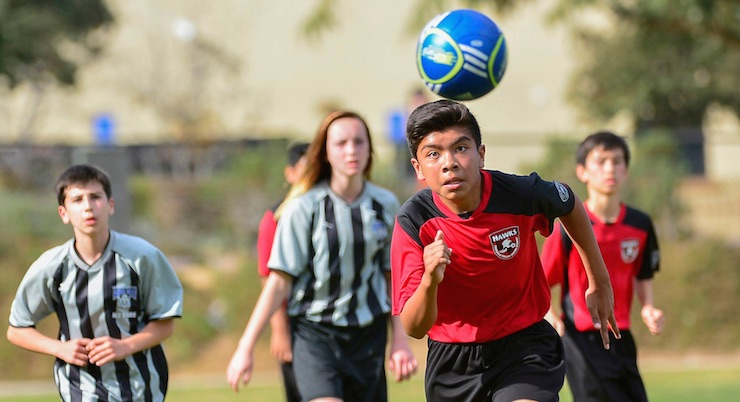
Diane Scavuzzo: Does depending upon volunteers to run an organization — like Cal South — really work?
Sue Abadie: It can, but you need everyone to work together to make it effective.
Paying people does not always make things better.
We need more solutions to help members. For example, designating a contact to answer questions from soccer clubs regarding the knowledge governing the rules and regulations of USYS and Cal South — this would be very helpful to our soccer clubs.
Diane Scavuzzo: Who has been a mentor?
Sue Abadie: Gary Sparks, Paul Doty, Derek Barraza, Sandy Castillo, and many others who I have met over the years.
Diane Scavuzzo: Do you see any challenges unique to being a woman involved in soccer?
Sue Abadie: One obstacle is most people representing soccer clubs/boards will seek out a man’s opinion before asking a woman, especially if credibility hasn’t been established.
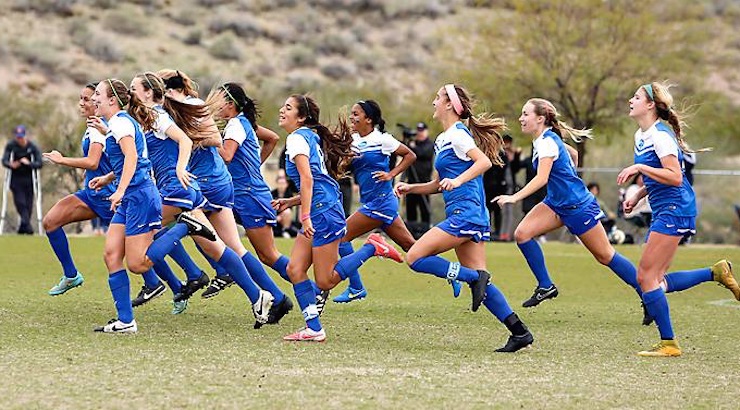
Diane Scavuzzo: What was youth soccer like back in the 60’s?
Sue Abadie: Most of the coaches were parents who had never played the game, but we
learned from books, clinics, and videos. In Southern California, recreational soccer was much bigger and had many more players than competitive club soccer — and, both had teams where boys and girls played together.
Youth soccer was different back then. Teams didn’t travel more than 25 miles for games.
Photo Credit: Cal South






